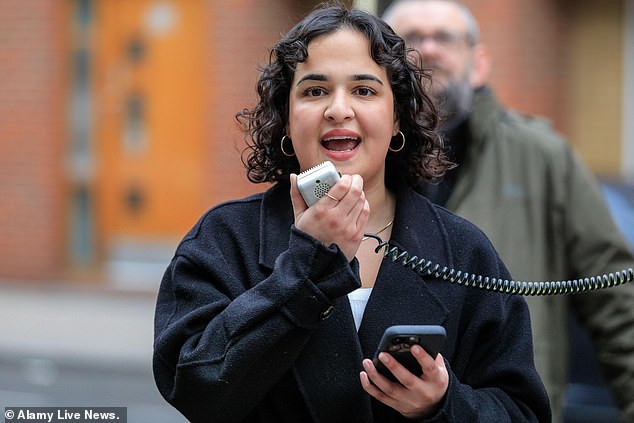An hour or so from Copenhagen, on opposite sides of a road running through flat Danish countryside, sit two bland-looking government centres.
One is a reception camp, Sandholm, the first stop for asylum seekers arriving in the country. The second, Sjaelsmark, is a very similar looking place. It is where migrants await swift deportation.
These twin sites are the centrepiece of Denmark’s immigration system. Ruthlessly efficient and wholly unrelenting, the approach has created a hostile environment to illegal arrivals which has been applauded by Left-leaning Danish voters at the ballot box.
Once a deportation ruling is made (which is often), pleas for mercy are ignored. A migrant whose time is up is flown back to their home country flanked by Danish guards plus, often, an official from the European Union.
The deportee is handed over to the police at their destination. And that, as the Danes might say, is the end of the matter.
No wonder that Sir Keir Starmer is, rather enviously I suspect, eyeing up the Danish model as he tries to solve our own out-of-control immigration – not to mention our abject failure to remove those with no right to be here.
During the past week, as Channel winds dropped, more than 1,700 strangers expecting free housing, food, medical care and pocket money have arrived in Dover. Whether any of them will ever leave again is anyone’s guess. But almost certainly not.
Earlier this year, Starmer met his Danish opposite number, Mette Frederiksen, at Downing Street to pick her brains about how her Social Democrat government has achieved a 90 per cent drop in asylum applications.

Earlier this year Starmer met Mette Frederiksen to pick her brains about how her Social Democrat government has achieved a 90 per cent drop in asylum applications

Home Secretary Shabana Mahmood dispatched her own senior officials to Copenhagen to study what lessons can be learned from the Danes
In 2024, these plummeted to 2,333 as the Danes told migrants in a successful international social media campaign: ‘You are not welcome here.’ A few weeks ago, Home Secretary Shabana Mahmood got in on the act, dispatching her own senior officials to Copenhagen to study what lessons can be learned from the Danes.
Ms Frederiksen’s government has described unfettered immigration as a ‘daily threat to the life of Europe’. She wants to protect the livelihoods of working-class Danes and stop schools and welfare systems from being overwhelmed by newcomers.
Seven years ago, the country banned the burka and, later, introduced a ‘no-ghetto’ policy by dispersing migrants around provincial towns. The lucky few who do get to stay in the country have to attend compulsory lessons in Danish.
What, many might ask, is wrong with that? Like many Britons, I see nothing wrong at all. Yet, inevitably, the very thought of a Danish-style plan has triggered a backlash from some Labour MPs.
Nadia Whittome, representing Nottingham East, told BBC Radio 4’s Today programme that it was ‘racist’, adding: ‘I think this is a dead end – morally, politically, and electorally.’
Her fellow Labour MP, Clive Lewis from Norwich South, accused Denmark’s Social Democrats of going ‘hardcore’ on immigration and adopting ideas of the ‘far-Right’.
This sharp-tongued criticism will be water off a Danish duck’s back, though. Goodness knows what our open borders fanatics would say to Denmark’s ruling that migrants carrying gold or jewels must hand it over at the border to pay for their stay.
For the clever trick is this: the policy has pulled the rug from under Right-wing parties which have been silenced by the Social Democrats’ success story. I went to Denmark following Ms Frederiksen’s London visit. I talked to asylum seekers coming in and to rejected migrants going out.

Labour MP Nadia Whittome described the idea of a Danish-style immigration model as ‘racist’
I discovered that it is not only people of Danish heritage who welcome the hard line taken by their government, but successfully settled migrants, too.
In Copenhagen, a Palestinian, Ismail Schbaita, offered me a cup of tea at his corner shop. It sits in an area once plagued by migrant turf wars over drugs and gun fights in the street. Two bullets from the bad old days scar the doorway of his store.
He said that since the crackdown on burkas, ghettos and migration in 2019, when the Social Democrats came to power, things have improved beyond recognition: ‘It is completely different. We are much safer.’
The next day, at the Sandholm reception centre, it was obvious that many migrants were ‘asylum shoppers’ who had come to Denmark from EU countries that had already deported them.
One was a 53-year-old Syrian Kurd called Hosain, who had crossed the border from Germany in a smart white Mercedes with his two friends the week before.
He claimed to be a plasterer who ‘deals in cash’ and showed me a picture of his work in Hamburg.
He was carrying a tanbur – a Kurdish stringed instrument – which he proudly played for me in the car park.
The chances of Hosain winning asylum, for which he had instantly applied on arrival, seemed slim to me.
He said he had four ex-wives and seven children sprinkled around Europe.
‘Denmark is my last chance,’ he added, with what looked like a wink. I knew his next stop would be the deportation centre, Sjaelsmark, across the road – and a one-way ticket back to Germany and his black-market job.
Things can go wrong in any system, of course. ‘Genuine refugees fall through the net,’ said Soren Sondergard a 70-year-old Left-wing politician and former Member of the European Parliament.
I agreed with him. I have always thought the biggest enemy of deserving refugees are the rogues who come to Britain for benefits, deceiving our own, naive, Left-wing politicians in the process.
That said, in Sjaelsmark, I met Carlson Agwo, a 48-year-old barrister from Cameroon.
He had been caught up in a little-reported civil war back home between the English-speaking community (to which he belonged and gave legal advice) and the French speakers who dominate the country.
He deserved, in my view, to stay in Denmark. But he was returned.
He told me this week by WhatsApp: ‘On May 19, in the morning, three policemen arrested me at the deportation centre. I was transferred to prison and my phone confiscated.
‘At 4am, two days later, I was taken by the same police by road to Brussels airport, from where I was flown to Cameroon. I was put in a prison cell.
‘The Danish authorities were aware about this imprisonment before they left to go back. I was released [from jail in Cameroon] only after my family begged that I should be.’
Carlson is now in hiding in his home country.
He told me that it had been a ‘bad choice’ to go to Denmark. And that, sadly for him, is exactly the message that Copenhagen, for all its liberalism, wants to send.
It hopes that any migrants who think of knocking on the door will hear that message loud and clear.
Now, many Britons, like myself, can only pray that Keir Starmer is brave enough to fight off his Left-wing backbenchers and follow the example of pioneering Denmark.